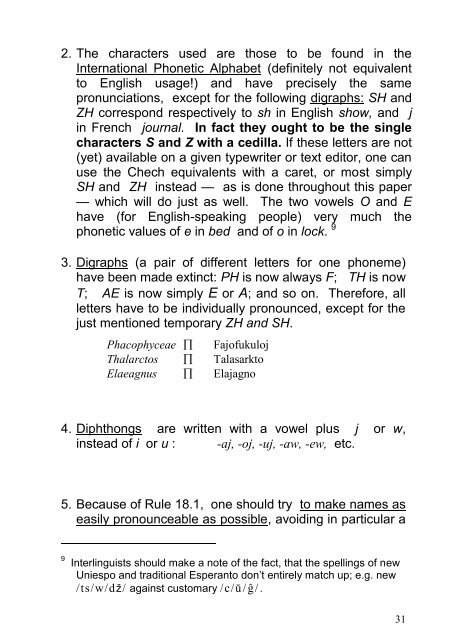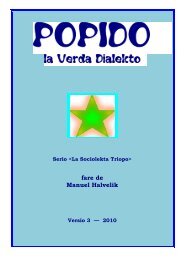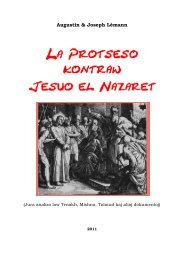the TRIMERAL SYSTEM in BIOLOGICAL TAXONOMY - universala ...
the TRIMERAL SYSTEM in BIOLOGICAL TAXONOMY - universala ...
the TRIMERAL SYSTEM in BIOLOGICAL TAXONOMY - universala ...
Create successful ePaper yourself
Turn your PDF publications into a flip-book with our unique Google optimized e-Paper software.
2. The characters used are those to be found <strong>in</strong> <strong>the</strong><br />
International Phonetic Alphabet (def<strong>in</strong>itely not equivalent<br />
to English usage!) and have precisely <strong>the</strong> same<br />
pronunciations, except for <strong>the</strong> follow<strong>in</strong>g digraphs: SH and<br />
ZH correspond respectively to sh <strong>in</strong> English show, and j<br />
<strong>in</strong> French journal. In fact <strong>the</strong>y ought to be <strong>the</strong> s<strong>in</strong>gle<br />
characters S and Z with a cedilla. If <strong>the</strong>se letters are not<br />
(yet) available on a given typewriter or text editor, one can<br />
use <strong>the</strong> Chech equivalents with a caret, or most simply<br />
SH and ZH <strong>in</strong>stead — as is done throughout this paper<br />
— which will do just as well. The two vowels O and E<br />
have (for English-speak<strong>in</strong>g people) very much <strong>the</strong><br />
phonetic values of e <strong>in</strong> bed and of o <strong>in</strong> lock. 9<br />
3. Digraphs (a pair of different letters for one phoneme)<br />
have been made ext<strong>in</strong>ct: PH is now always F; TH is now<br />
T; AE is now simply E or A; and so on. Therefore, all<br />
letters have to be <strong>in</strong>dividually pronounced, except for <strong>the</strong><br />
just mentioned temporary ZH and SH.<br />
Phacophyceae Fajofukuloj<br />
Thalarctos Talasarkto<br />
Elaeagnus Elajagno<br />
4. Diphthongs are written with a vowel plus j or w,<br />
<strong>in</strong>stead of i or u : -aj, -oj, -uj, -aw, -ew, etc.<br />
5. Because of Rule 18.1, one should try to make names as<br />
easily pronounceable as possible, avoid<strong>in</strong>g <strong>in</strong> particular a<br />
9 Interl<strong>in</strong>guists should make a note of <strong>the</strong> fact, that <strong>the</strong> spell<strong>in</strong>gs of new<br />
Uniespo and traditional Esperanto don’t entirely match up; e.g. new<br />
/ts/w/dž/ aga<strong>in</strong>st customary /c/ŭ / ĝ/ .<br />
31






